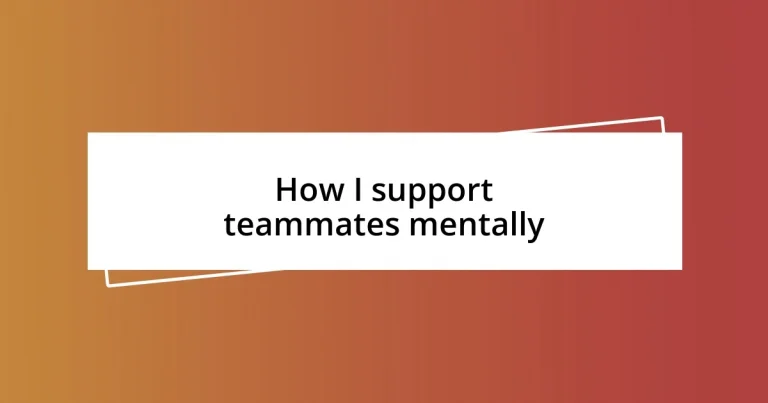Key takeaways:
- Identifying subtle behavioral changes and physical signs of mental distress in teammates is crucial for providing support and fostering a culture of open communication.
- Creating a positive team environment through trust-building activities, celebrating contributions, and sharing uplifting messages enhances team dynamics and morale.
- Encouraging the use of professional mental health resources and normalizing mental health conversations in the workplace can significantly benefit teammates struggling with distress.

Identifying signs of mental distress
I’ve noticed that the first signs of mental distress can often manifest in subtle changes in behavior. For instance, a usually chatty teammate might become quiet and withdrawn, sparking concern in me. Have you ever felt like something was off, but couldn’t quite put your finger on it? Those moments can be pivotal.
Another key sign is a shift in work quality. I remember a project where a friend, who always nailed deadlines, suddenly struggled to complete tasks. It made me wonder, what pressures might be weighing on them? Asking open-ended questions can create a space for sharing without judgment, which I find incredibly important.
Physical signs shouldn’t be overlooked either. Look for things like changes in sleep patterns or neglecting personal hygiene. I recall a period when I myself was overwhelmed; I started skipping breakfast and it took a toll on my energy levels. When I recognize these signs, I make it a priority to check in and offer my support. After all, sometimes bringing attention to these issues can make all the difference.
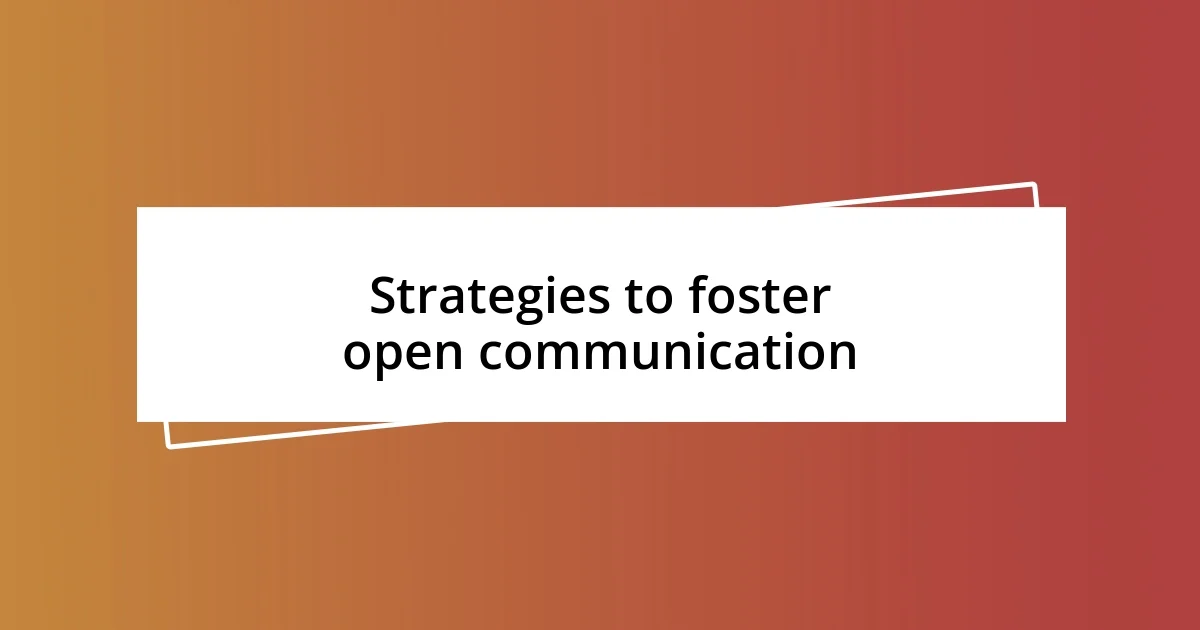
Strategies to foster open communication
One effective strategy to foster open communication is to create a supportive environment where teammates feel safe to express themselves. I’ve seen how sharing personal experiences can bridge gaps. For example, during a team meeting, I once shared my struggles with anxiety, and that openness encouraged others to share their own challenges. This mutual vulnerability strengthened our bonds and built trust within the team.
Here are a few practical strategies to enhance open communication:
- Set Regular Check-Ins: Schedule one-on-ones to discuss not just work but also personal well-being. I’ve found that regular check-ins can spark deeper conversations.
- Encourage Team Activities: Engage in team-building exercises that foster a relaxed atmosphere. I remember a team retreat where light-hearted games led to authentic conversations.
- Active Listening: Show genuine interest in what your teammates say without interrupting. Reflecting back what I’ve heard can show empathy and understanding.
- Anonymity for Sharing: Implement anonymous feedback tools for those who may feel hesitant to speak up. I once participated in a survey that allowed us to voice concerns without fear.
- Celebrate Vulnerability: Acknowledge when someone shares their feelings or struggles. Recognizing courage can motivate others to open up. I always feel uplifted when teammates support one another in sharing their stories.
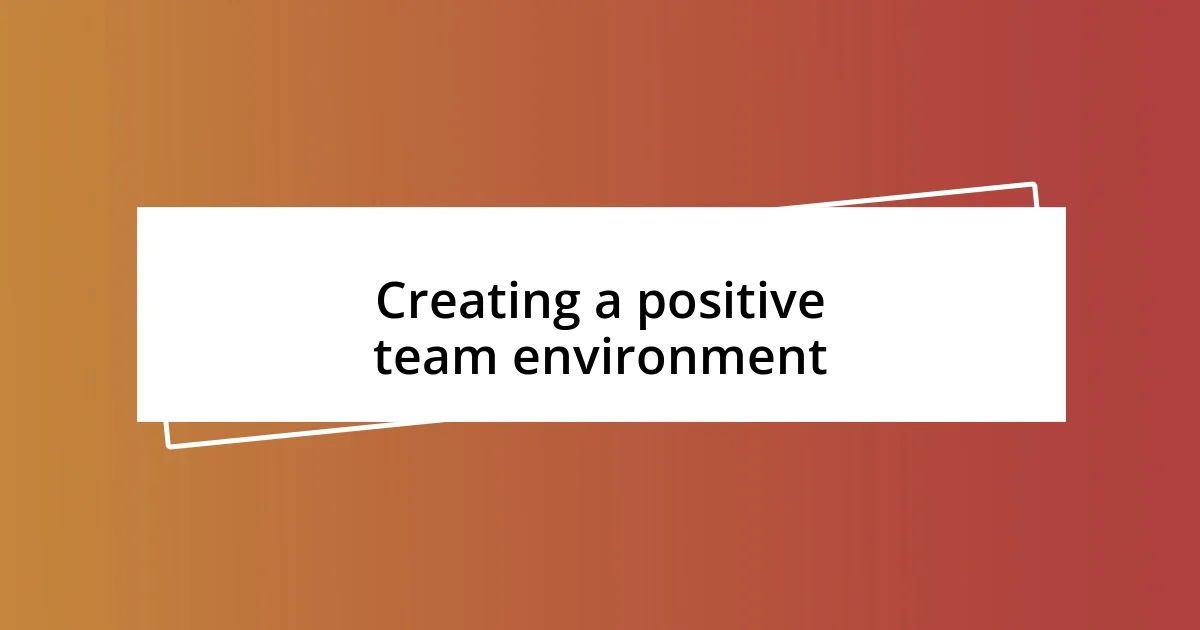
Creating a positive team environment
Creating a positive team environment starts with establishing trust among teammates. I vividly recall a time when our team organized weekly casual coffee break sessions. These unstructured moments not only allowed us to relax but also created a sense of community. By sharing stories over coffee, we broke down barriers, making it easier for everyone to approach their teammates with concerns or ideas. Have you ever felt that sense of connection over a shared laugh? It really transforms the workplace atmosphere.
Another crucial aspect is recognizing and celebrating individual contributions. It’s exhilarating when I acknowledge the exceptional work of a teammate in front of the group. I remember a colleague who spearheaded a successful project—her face lit up when I gave her a shout-out during a team meeting. These small gestures elevate morale and make team members feel valued. Doesn’t it feel great to be appreciated for your hard work?
To further enhance our interpersonal dynamics, promoting a culture of positivity is essential. I often make it a point to share positive feedback or uplifting quotes in our team chat. Just last week, I posted a quote about perseverance, and it sparked a fulfilling discussion about challenges we’ve overcome together. Encouraging everyone to contribute positively cultivates an environment where support and encouragement flourish.
| Aspect of Team Environment | Benefits |
|---|---|
| Casual Team Interactions | Builds camaraderie and trust, making it easier to communicate openly. |
| Celebrating Contributions | Boosts morale and ensures individuals feel valued and recognized for their efforts. |
| Positive Messaging | Encourages a supportive atmosphere and fosters discussions about growth and resilience. |

Techniques for providing emotional support
One technique that has worked wonders for me in supporting my teammates emotionally is practicing mindfulness together. I remember organizing a short meditation session after a stressful project deadline. It was fascinating to see how everyone relaxed, leaving behind the chaos of the workload. Have you ever noticed how just a few minutes of focused breathing can change the energy of a group? It can help create a shared sense of calm.
Another effective approach is to offer my support through small acts of kindness. For example, I’ve taken it upon myself to leave encouraging notes for team members, especially during tough times. Just a simple “You’ve got this!” stuck to their monitors can brighten someone’s day. It often makes me wonder: isn’t it amazing how a few thoughtful words can lift someone’s spirits?
Finally, fostering a culture of peer support can make a significant difference. During a particularly challenging quarter, I proposed a buddy system. Each teammate partnered up for regular check-ins, sharing both struggles and successes. Reflecting on that time, it was heartwarming to see how these connections evolved—people went from acquaintances to true companions. Who doesn’t want someone to lean on when times get tough?
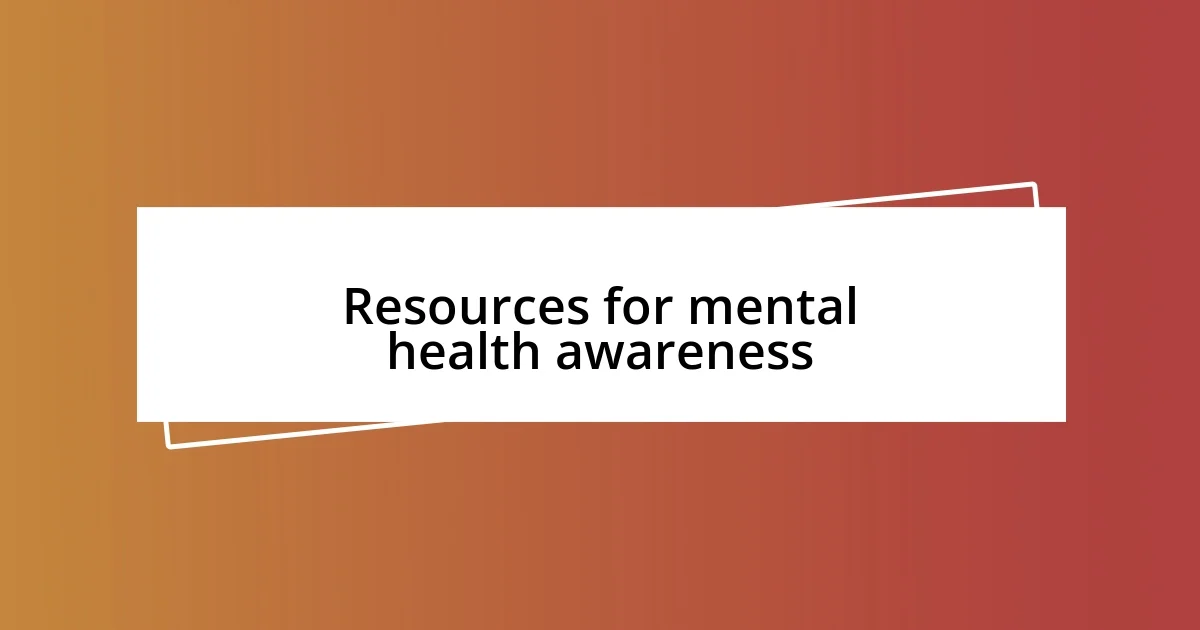
Resources for mental health awareness
When it comes to mental health awareness, a variety of resources can be incredibly empowering. For instance, I make a habit of sharing articles and videos that focus on managing stress and anxiety. Just the other day, I stumbled upon a TED Talk on resilience that sparked a great discussion within our team. Isn’t it amazing how a shared learning experience can foster deeper understanding and empathy among colleagues?
Additionally, I believe in the power of mental health workshops and webinars. I participated in one recently, and the skills I acquired not only helped me but also enhanced my ability to support my teammates. Accessing external resources allowed us to approach mental health topics in a structured way, leading to an atmosphere where sharing personal struggles felt more acceptable. Have you ever thought about how seeking knowledge together can help break down stigmas?
Lastly, I find that having access to counseling services or hotlines is crucial. In my experience, simply knowing that professional help is available creates a level of security for colleagues who may be hesitant to reach out. I remember when a teammate confided in me about feeling overwhelmed, and I gently nudged them toward our employee assistance program. Seeing them take that step was inspiring—sometimes, the hardest part is just knowing where to turn for support.
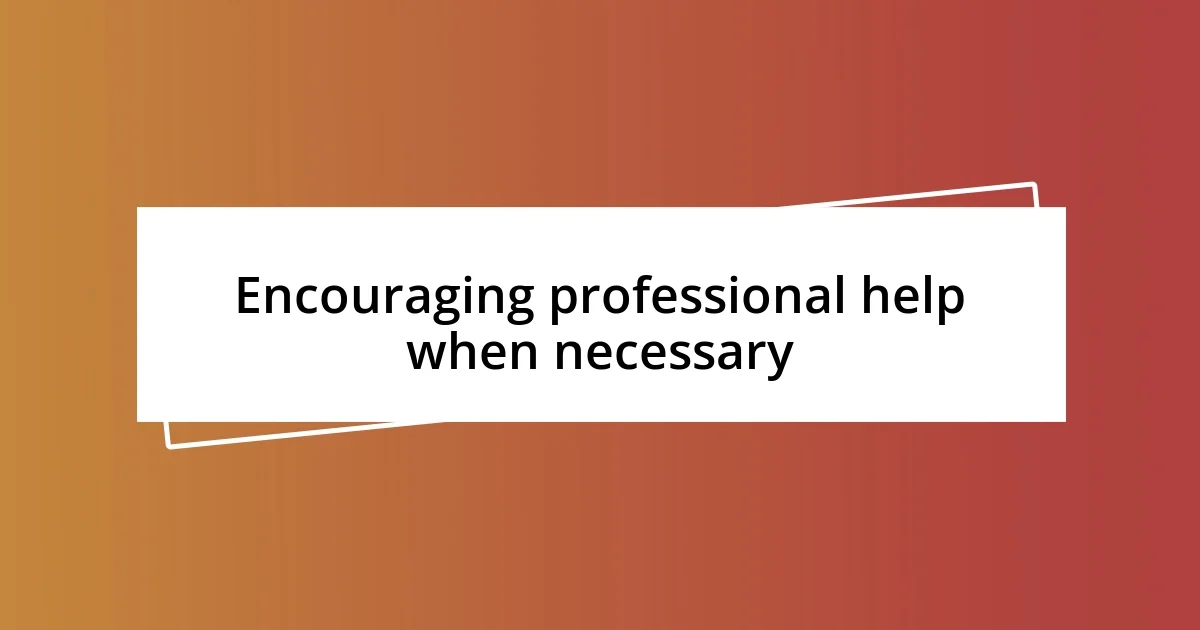
Encouraging professional help when necessary
Encouraging professional help when necessary is something I’ve come to see as absolutely vital in a supportive work environment. There was a time when a close colleague was visibly struggling but hesitant to seek professional assistance. I casually mentioned a local therapist who specializes in work-related stress, and it felt rewarding when they finally reached out for help. Reflecting on this, I wonder: how often do we underestimate the impact of a gentle nudge toward professional support?
It’s important to normalize conversations about mental health in the workplace. I remember discussing mental health during a team meeting and suggesting we all keep an eye out for resources. The relief in the room was palpable. It was as if a weight was lifted, with several teammates admitting they, too, had sought therapy or counseling at different points in their careers. This openness made me think—why is it still so hard for some to speak up?
I also encourage teammates to explore our company’s mental health resources, like counseling services. One day, I noticed a teammate feeling increasingly withdrawn. I had a heart-to-heart with them and shared the benefits of talking to someone professionally. They took my advice, and months later, they expressed how it completely transformed their outlook on life. Doesn’t it feel empowering to know that helping someone find the right path can lead to such significant positive changes?












